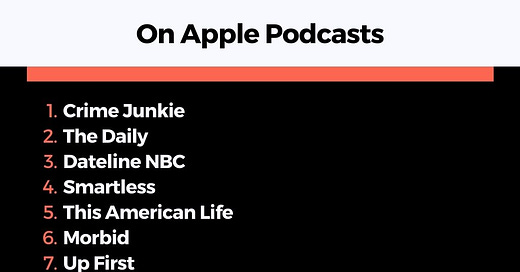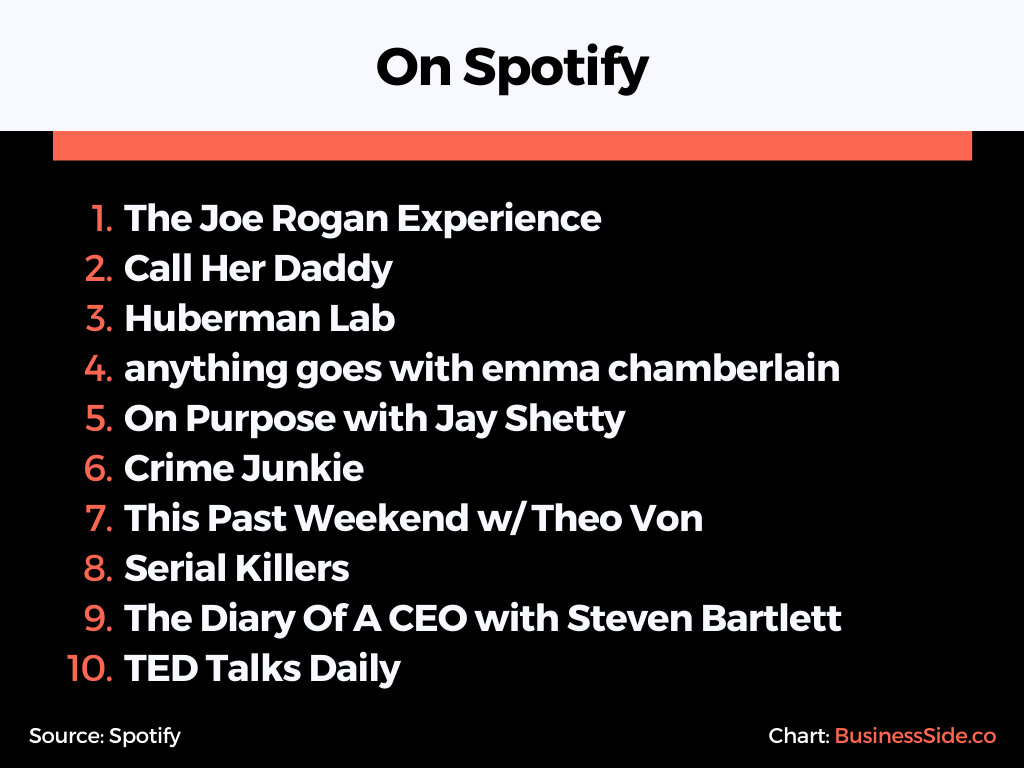
Weekly Briefing: Friday, December 1
Happy Friday! And welcome to Business Side’s Weekly Briefing.
In today’s edition:
Top developments at Jezebel, PopSci, and The Telegraph.
Benchmarks on podcasts, The Free Press, and Bloomberg.
Viewpoints from operators at WaPo, Industry Dive, and the FT.
Plus more news from across the media industry.
Let’s get to it.
Thanks for reading Business Side! If this email was forwarded to you, subscribe to get the latest media intel every Friday.
Jezebel lives! Weeks after it was shut down by G/O Media, Jezebel was acquired by Paste Magazine this week. The defunct political site Splinter was also included in the deal.
About Paste: Paste Magazine, founded in 1998, is a digital site with “great writing about Music, Movies, TV, Comedy, Games, Books, Comics, Drinks and Politics.” Its masthead lists 18 editors, along with a slew of contributing writers.
Rationale: Paste President and EIC Josh Jackson shared his rationale: “We’ve gone through all the different changes in the media landscape and stayed independent and have survived and thought, ‘Hey, maybe we can do this with other sites as well’... I want them to push the boundaries… I think there are advertisers out there who have the courage to go to where the audience is.”
Revenue model: Paste is 100% ad-supported, and if you visit the site you’ll see lots of ads, which create a less-than-optimal user experience. The acquisition of Jezebel might be an opportunity to experiment with some paid products, given Jezebel’s passionate following.
Ownership: Paste is owned by Wolfgang’s, which sells music memorabilia. Like Jezebel, Wolfgang’s seems to be a company with a strong personality, as displayed on its about page: “Wolfgang’s products represent our nostalgic past when great music supplemented and supported our public discourse. When protest was a good thing and resulted in real change for Black Americans, Women and Gays. When we followed real leaders who spent their time pursuing a vision not the next election. A sentimental bond to an earlier time is at the heart of Wolfgang’s.”
The end of print at PopSci. After 151 years, PopSci will no longer publish a print magazine.
A small team: After recent layoffs, PopSci has only five editorial staffers, along with a few people on the commerce team.
The model: PopSci, owned by Recurrent Ventures, has a toe in a number of different areas. It runs ads on the site; has a commerce section dedicated to gear; and last year launched a $12 / year paid membership. It also publishes videos on YouTube, as well as a couple podcasts.
What would you do? It may be that PopSci is stretched across too many areas. With a small staff, it’s impossible to excel across so many different formats & revenue strategies. In the near-term, I’d love to see PopSci narrow its focus and invest in growing its core audience. After achieving runaway success in one area (whether it’s podcasts, YouTube videos, paid newsletters, or something else), there will be opportunities to return to a more diversified approach.
A sale? Recurrent Ventures recently sold its culinary & travel brand Saveur to its editorial director. I think PopSci could be a great acquisition opportunity for a leader with a passion for the magazine and its history.
The Canada / Google deal. Google agreed to pay Canadian news companies around $100 million annually.
Key to the agreement is that Google will negotiate with a single group representing publishers, rather than each company individually.
A replicable model? A Canadian official told Reuters the model is likely to serve as an example for other countries.
In the United States, debate continues about the proposed Journalism Competition & Preservation Act and the California Journalism Preservation Act, which would also compel tech companies to pay new organizations.
A perspective from Ken Doctor, industry analyst and operator: “We can applaud the well-meaning intentions of lawmakers and ask that any legislation focus on one key metric, the one that everyone says they care most about: How much original local news reporting can be added? … we can reward local news newsroom headcount.”
Jeff Zucker, Abu Dhabi, and The Telegraph. It’s been a wild week as the potential deal attracts controversy because of the foreign funding. Here’s the latest:
Yesterday, the UK announced that it would open a review of the deal, with a decision expected by late January.
The deal: Last week Jeff Zucker’s Redbird IMI, a joint venture between private equity firm Redbird and Abu Dhabi-based IMI, announced its intention to acquire control of The Telegraph. Sheikh Mansour bin Zayed al Nahyan, a member of the Emirati royal family and owner of the Manchester City F.C., would pay off a large portion of the debt.
The strategy: Zucker’s “vision for The Telegraph includes a potential expansion into the United States, where Mr. Zucker believes a market has emerged for a center-right news publication,” according to an anonymous source in the NYT.
Foreign funding: Jeff Zucker gave an interview to The Telegraph where he tried to address his critics, saying, “I would resign if Abu Dhabi interfered.”
Most popular podcasts of 2023:
Some insight on the rankings from Ariel Shapiro of Hot Pod:
“As you can see, there is surprisingly little overlap between the two lists. Only Crime Junkie and Huberman Lab appear on both. And while Apple has a lot of true crime, news, and old podcast standbys, Spotify’s list is stronger on celebrity chat shows (particularly its own).
“According to a study by Cumulus and Signal Hill, Apple’s podcast listeners tend to be older than Spotify’s (median age of listeners is 41 vs. 37, respectively). And while Spotify has an even split in terms of gender, 61 percent of Apple Podcast users are female. Additionally, longtime podcast listeners prefer Apple to Spotify.”
More benchmarks:
Bari Weiss’s The Free Press:
$5 million in revenue expected this year
20 full-time staffers
520,000 subscribers
75,000 paid subscribers
Advertising accounts for one-third of revenue (WSJ)
At Bloomberg Media, 88% of 500,000 subscribers pay annually.
Incoming WaPo CEO William Lewis on young audiences:
“What most people blithely say — that young adults just aren't interested in the news — is absolute garbage. It turns out the reason they weren’t interested in the news is that they were having to suffer listening to old white men like me, behind a table, blathering on about what happened in Congress yesterday. If you actually do it in a way that is by people that look and feel like them in a language that they understand about issues that they understand, they are very, very interested in news.”
Bloomberg Media chief digital officer Julia Beizer on subscriptions and the revenue mix:
"Diversification is the name of the game. And that was the reason we got into this [subscription] business in 2018. But the subscriptions business has grown faster than we anticipated, and certainly than we modeled. So it's become a really, really significant player. Our three major revenue streams are advertising, subscriptions, and events. So it's one of the big three."
A group representing Dow Jones journalists opposing a proposal that the NewsGuild issue a statement supporting the ceasefire in Gaza:
“Taking public positions on news events we cover damages the confidence our members have earned through decades of impactful reporting in war zones and throughout the world, fueling the misconception that reporters are advocates rather than observers.”
FT editorial product director Hannah Sarney on the FT’s “Next Gen Board,” a group of emerging leaders within the business.
“It’s a source of rapid, diverse and trusted feedback and ideas to run the business... It also acts sometimes as a shadow board on certain key strategic themes for our FTGroup Management Board, and a lot about silo breaking, and networking.“
Industry Dive managing director & head of content Andy Burt on their audience approach:
“In our business, in the niche B2B vertical, we care about carefully crafted slices of industry. If you reach 100 of these ‘perfectly correct’ people, it is more valuable than a hundred thousand. This is the proposition we believe in and that’s what we try to pursue.”
Nieman Lab’s Joshua Benton on legal battles around AI and copyright:
“I suspect the news industry’s attempts to get money out of the AI business will look a lot like its attempts to get money out of Google and Facebook. The tech companies will largely win in the courts, but to head off reputational damage, they’ll be more than happy to hand out lots of big cardboard checks.”
Leadership:
Bloomberg Media CEO Scott Havens is leaving to become president of business operations for the New York Mets.
Karen Rundlet will be the new CEO of the Institute for Nonprofit News. A former journalist, Rundlet has managed journalism grants at the Knight Foundation.
NPR appointed Gimlet executive Collin Campbell to lead its podcast division.
Layoffs:
Vox is undergoing layoffs, according to an internal email.
At WaPo, 120 people have taken voluntary separation packages so far, as a part of plans to reduce staff by 240 people total.
BBC News is cutting 127 jobs but adding 147 new digital roles.
50 Vanity Fair staffers signed a letter protesting layoffs at the company.
Launches:
The BBC expanded its subscription podcast offering globally, after a limited rollout in select countries.
The NYT is relaunching its nightlife coverage.
The Guardian signed a first-look deal with Sony Pictures.
AI:
Sports Illustrated severed ties with a third-party content provider that published content from allegedly fake writers with AI-generated photos.
A growing list of publishers are blocking Google’s AI models from accessing their sites.
Documentary filmmakers called for standards governing the use of generative AI.
Governance:
Local publishers are enduring crackdowns by local governments, infringing on press freedoms.
The Atlantic published a piece highlighting 16 Substack newsletters with Nazi symbols. Substack’s response: “Substack has a content moderation policy that protects against extremes—like incitements to violence—but we do not subjectively censor writers outside of those policies.”
Plus:
X may lose up to $75 million in ad revenue after more advertisers halt spending on the platform. WaPo paused advertising on X after Elon Musk amplified a meme about the Pizzagate conspiracy. And advertisers told the NYT they are standing firm after Musk insulted advertisers in a live interview.
The WSJ wrote a feature on “ghost newsrooms,” local outlets without any local full-time reporters.
Thanks for being a part of Business Side’s public beta. Have a great day!
Was this forwarded to you? Subscribe here.






